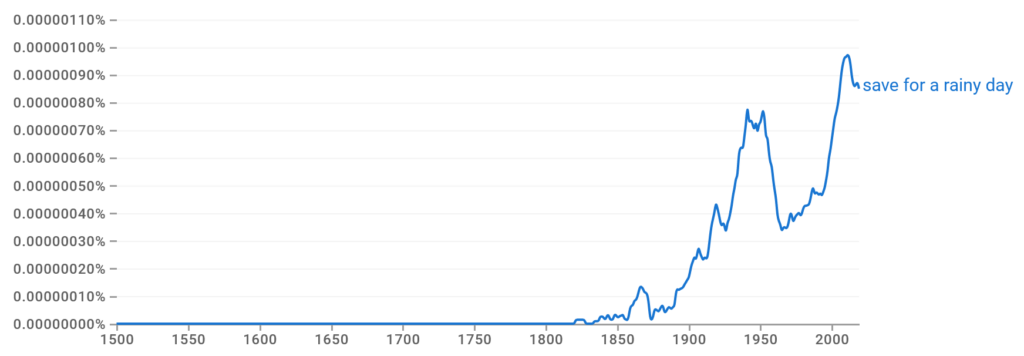Save for a rainy day means setting something aside for future use when needed. This idiomatic expression is generally used when referring to money.
Idioms like this are expressions used in a non-literal or figurative way, although some can have a literal meaning. They often carry cultural nuances and may not be immediately clear outside specific regions. Widely used in the English language, they serve to add humor, emphasis, and color to communication.
This article delves into the meaning, origin, and usage of the idiom save for a rainy day, offering examples to illustrate its application. It also explores variations and related terms, concluding with a quick quiz for you to test your knowledge. Keep reading to gain a comprehensive understanding of this idiom.

What Does the Idiom Save for a Rainy Day Mean?
The idiom save for a rainy day means setting aside money or resources for future needs or unexpected challenges. It emphasizes the importance of financial prudence and preparedness. So, someone might say they are saving for a rainy day when they put money into a savings account or buy an investment product.
Here’s how some major online dictionaries define the idiom save for a rainy day:
- Cambridge Dictionary: “to save money for a time when it might be needed unexpectedly”
- Collins Dictionary: “to save some of your money in case there are serious problems in the future”
For instance, when my car unexpectedly broke down last year, I was grateful I had saved for a rainy day. Having that extra fund allowed me to cover the repair costs without stressing about my budget.
Variations of the Idiom
The following phrases are variations of the idiom that mean the same:
- Set aside for a rainy day
- Prepare for a rainy day
- Sock away for a rainy day
- Stash for a rainy day
- Keep back for a rainy day
How Is Save for a Rainy Day Commonly Used in Context?
The idiom save for a rainy day is a commonly heard phrase, resonating in various situations where financial prudence and preparedness come into play.
In the sections below, we explore its practical applications and contexts. Discover how this idiom is employed, find examples that illustrate its usage, and gain valuable tips on effectively using it in conversations and decisions.
What Are the Different Ways to Use Save for a Rainy Day?
- Emergency fund: “Raven is putting aside cash each month to save for a rainy day.”
- Savings account: “Clarke opened a savings account to save for a rainy day. Keeping that separate from her regular account means she’s not tempted to dip into it.”
- Investing wisely: “I’m putting some money away into a low-risk investment fund to save for a rainy day without risking all my capital.”
- Insurance: “My financial advisor recommends taking out insurance coverage on my home, health, and valuables as a way of saving for a rainy day.”
Where Can You Find Examples of Save for a Rainy Day?
The idiom save for a rainy day is commonly used across different media, including newspapers, websites, articles, film scripts, popular music, and magazines.
Here are some examples of the idiom’s use in modern culture:
SAVING for a rainy day may help homeowners wash away the blues, according to new research by Lloyds Bank. (The Henley Standard)
It is important to save for a rainy day, since savings can cushion you when you have urgent financial needs which may occur outside your normal salary cycle. (The Daily Nation)
What Are Some Tips for Using Save for a Rainy Day Effectively?
Here are some tips for using the idiom save for a rainy day effectively and correctly in everyday writing or conversation:
- Non-literal usage: The idiom is used figuratively, and its meaning is not meant to be taken literally. Avoid using it to refer to saving money specifically for adverse weather conditions.
- Context matters: The idiom is typically used to imply financial advice of setting aside money for times when you might need it.
- Avoid overuse: Use the phrase sparingly and keep it for situations where its meaning is most effective and appropriate.
- Know your audience: Save for a rainy day might cause confusion when communicating with non-native English speakers. Therefore, it’s advisable to reserve the use of this idiom for informal conversations with individuals familiar with its meaning.
What Is the Origin of the Idiom Save for a Rainy Day?

The idiom save for a rainy day can be traced back to the mid-1500s, originating from an Italian play called “La Spiritata” written by A. F. Grazzini.
The play was later translated into English by John Lyly and renamed “The Bugbears,” where the phrase appeared as, “Wold he haue me kepe nothing against a raynye day?”
How Did the Idiom Evolve Over Time?
Over time, it evolved as a widely used expression, emphasizing the concept of setting aside resources for unforeseen challenges. Its enduring popularity can be attributed to its adaptability and the universal understanding of preparing for unexpected difficulties.
What Are Some Related Terms to Save for a Rainy Day?
To grasp the meaning of save for a rainy day, exploring related terms such as synonyms and antonyms can provide context, aiding in a better understanding of its correct usage.

Synonyms
- Keep something in reserve
- Build a nest egg
- Save for the future
- Stash something away
- Put something by for a rainy day
- Keep something for a time of need
- Keep something in reserve
- Squirrel away for a rainy day
- Keep something in the kitty
Antonyms
- Careless with cash
- Extravagant with money
- Splashing the cash
- Frittering away your money
- Wasteful
- Prodigal
- Living beyond your means
Save For A Rainy Day: Test Your Knowledge!
Choose the correct answer.
Let’s Review
Mastering the idiom save for a rainy day unveils the art of financial prudence, a timeless concept rooted in a 16th-century Italian play. As language evolves, so does the idiom—from its literal origins to a universal symbol of preparedness. Whether you’re bolstering an emergency fund, investing wisely, or securing insurance, the wisdom persists.
Use it judiciously, understanding its figurative power. This journey through idiomatic expression enriches your linguistic repertoire while offering practical insights for financial well-being. As you navigate life’s uncertainties, may the idiom guide you to fiscal resilience. Keep saving wisely, embracing the lessons of preparedness.
